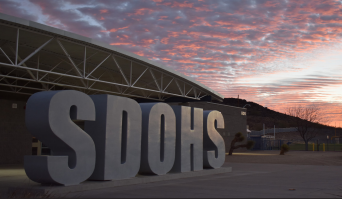Last November, one of the most impactful election results was a decision that directly affected Sandra Day O’Connor High School. The Deer Valley Unified School District Bond and Override did not pass, consequently cutting funding to all affiliated schools. Starting next school year, a phase-down of $33 million will occur, reducing $11 million in financial support a year for three years.
The override was not a new tax or tax increase. It costs homeowners an average of less than $21.27 a month. While the education of children should be a bipartisan issue, anti-public education sentiments and misinformation campaigns are on the rise. Yet, many voters cannot differentiate between an override and a bond.
“The override is more people-oriented and tied to programs that impact students. A bond is more focused on facilities, things you can see like our roof and things to buy to keep the machine rolling,” said Dr. Curtis Finch, Deer Valley Unified School District superintendent.
Unfortunately, the language on the ballot intentionally misrepresented the override’s meaning. Voters who did not conduct prior research were likely confused while interpreting terminology in the booth.
“[Legislatures] specifically chose the word override. The better word would have been local community support because these are outside our budget,” Finch said.
The override is set for a defined number of years. For instance, if a five-year override is passed, it will not reappear on a ballot until the five years have elapsed and it has expired. However, there is still hope that the override and bond could be reintroduced immediately, reversing the phasedown.
“The override can be voted on at any time: any November. It has to be approved to be placed on the ballot in May so it can be ready for November and so they can make the ballots. I will probably be recommending that, but the governing board are the ones that actually vote if it goes on the ballot,” Finch said.
Many physical aspects of OHS are specifically dependent on the bond.
“We have 2600 kids walking through the halls and over time the facilities can wear out if we’re not maintaining them… We use the old staff lounge and mini auditorium as a classroom… In Fine Arts, there is a need to upgrade the stage, lighting, backdrops, and cabling so we don’t have any accidents and, so we can provide a space that the students, the alumni, and the community can be proud of,” said Justin McLain, OHS assistant principal.
It is unnecessary to speculate about the potential future of DVUSD. Other districts that have not passed a bond or override in years illustrate what will occur.
“The concept I apply is a car. Today, Deer Valley has the fancy rims, they have the fancy paint job. We got the new plush interior. But if we can’t replace the tires, can’t replace the rims, eventually, that car’s going to wear out and not look very pretty, and then people are not going to want to ride in it. It’s the same concept,” Finch said.
One of the most essential areas for funding is the recruitment and retention of teachers. A decline in staff morale is detrimental, and many educators cannot afford a pay cut, as they often hold additional part-time jobs to make ends meet. The district must think of creative solutions.
“The override is 8% of everybody’s salary. In theory, I have been told by the voters you need to cut teacher salaries… Historically, when I run into these kinds of situations, I prefer to freeze a salary and I’m more likely to reduce the workforce rather than cut people’s salary,” Finch said.
Teacher salaries do not just impact individual educators but also create a domino effect that ultimately benefits the entire population.
“Teachers are the roadblock that prevents problems that could take place within our community. [They] do a great job of teaching and handling students in a proactive way that minimizes the need for more police officers, firefighters, health care workers because we’re able to take a more proactive approach,” McLain said.
DVUSD continues to grow exponentially. A teacher deficit, combined with more students, can lead to high class sizes. Maintaining a manageable class size is crucial as it enables teachers to provide quality attention to each student.
“I am a huge fan of lower class sizes. We have limits with teachers on how many kids they can actually handle, which is 170. We watch that very closely,” said Dr. Julie Spurgeon, OHS assistant principal.
OHS has its unique reason for an influx of individuals, notably foreign exchange students and residents in the surrounding area, due to the Taiwan Semiconductor Manufacturing facility. However, while it increases class size, there are accompanying benefits.
“When a big company comes like that with $65 billion worth of investment, it actually lowers the taxes that the average person pays because there’s more value to the zone economically and they are contributing more to that zone,” Finch said.
The bond and override offer indispensable resources for public school students. Although free ACT, AP tests, and lunch will not disappear instantly because they are not directly funded by the bond and override, a lack of opportunities could negatively impact performance, which does affect financing. Low-income students are particularly fearful about losing aid, as many cannot afford private or charter schools, placing them at an undeserving disadvantage compared to their peers.
“My job is to look through the equity lens, not the equality lens… AP for example, or the test taking, I believe the state rewards us for our great academic success and they give an X amount towards a different pot of money that allows us to bring the cost of the AP test down, or free. The same thing happens for lunch that’s subsidized by the state or the federal government,” Finch said.
Since the override funding also affects extracurricular activities and support services, community members are frightened about the possibility of cutting beloved programs.
“My philosophy is to not actually quit, kill, or stop a program. I prefer to reduce it and keep it in motion because once you stop something, it’s very hard to start it up again,” Finch said.
OHS possesses connections to effectively address the harm.
“We also get money from Rio Salado–from our dual program–that we are able to use. We also have athletic partners and sponsors that come in. Then, each of the different groups have the boosters,” Spurgeon said.
Outside the halls of OHS, critical programs for elementary students may also be endangered. The ramifications will, in due course, trickle down to high school.
“I know that all day kindergarten is vital for a student’s success in the future, that’s the foundation… and I know that I’m surrounded by competitors that will offer all day. So I will take from other places to try to keep that program going,” Finch said.
Although the administration was aware of the national narrative regarding public education, the override and bond not passing was still a disappointing surprise. It has been continuously approved since it was first introduced in 1991. District-wide staff meetings were held in order to navigate the next steps.
“Dr. Finch addresses staff, and we have a lot of different departments that will come into a big meeting and speak. It could be special education, human resources, and finance. Everything in the district is transparent,” Spurgeon said.
The most concerning aspect of the decision is the upsurge of political echo chambers. The district and Deer Valley Education Association political action committee (DVEA PAC) ran exceptional campaigns; nevertheless, the administration and advocates must reflect on what can be improved upon.
“Since it did not pass, we did not do enough, whether we think we did a good job or not… Yes, it was on our school website and we had some flyers around, but most of that campaigning was not done at the school site. So informative campaigns on a regular basis, public forums and meetings, success stories, tax impact clarification would improve information so that people can make a more educated vote and encourage that voter participation,” McLain said.
Despite Arizona being consistently ranked 50th in education, OHS fosters a culture of high-achieving students. Community awareness and involvement are of paramount importance in order to continue the tradition of excellence.
“Investing in education is investing in our future and the O’Connor students deserve it,” McLain said.



